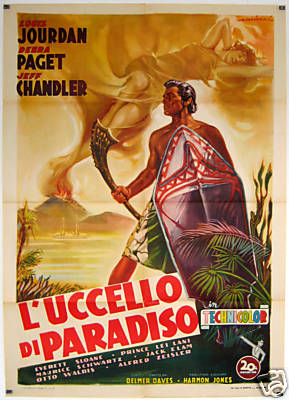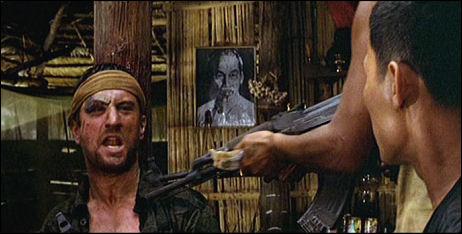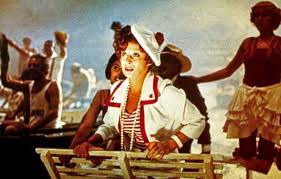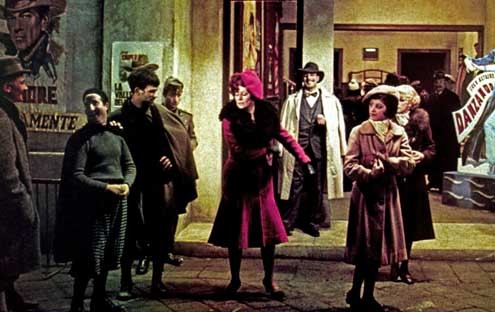
I’m glad that Dave Kehr’s recent column in the New York Times about the neglected and underrated Delmer Daves has spurred some interest in Daves on his web site, but disappointed that no one except for me has thought to bring up Daves’ 1951 remake of King Vidor’s 1932 Bird of Paradise. It’s true that I have some personal investment in this kitschy South Sea island tale, having written the first chapter of my autobiographical Moving Places: A Life at the Movies (1980; 2nd ed., 1995) about its significance for me. But the second chapter of the same book, a much longer one, is devoted to that same year’s Doris Day musical On Moonlight Bay, and I’d never dream of making any special case for that movie.

By contrast, what seems memorable about the 1951 Bird of Paradise, apart from its lush Technicolor, is a certain tragic sense of thwarted utopian and liberal multiculturism, similar in some ways to what can be found in Daves’ previous feature, also with Debra Paget and Jeff Chandler (and made at the same studio, Fox), Broken Arrow (1950). I suppose this could be written off as some sort of camp in both movies, but personally I find this less of a hoot than Daves’ penultimate feature, Youngblood Hawke (1964), which Dave describes as “interesting” and, like some of the posters on his site, seems to take relatively seriously. Read more
This review, one of the most incendiary I’ve ever written, appeared in the March 1979 issue of the Canadian monthly Take One (vol. 7, no. 4). It’s probably over the top, but at least it’s sincere; I can’t recall another occasion when any acclaimed movie filled me with such absolute loathing. I can recall thinking, when Cimino subsequently collected his Oscar, that he should have said at the time, “I’d like to thank especially the Vietnamese people, without whose corpses this award wouldn’t have been possible.”
The film is currently screening on Bologna’s Piazza Maggiore, although I’m delighted to report that programmer Ehsan Khoshbakht had the brilliant idea of screening Cinetract 101 just before it. — J.R.

“You beat me, baby,” Francis Ford Coppola reportedly said to Michael Cimino, director of the $13 million The Deer Hunter, in reference to the fact that this new Vietnam atrocity movie has opened several months before Coppola’s Apocalypse Someday. Considering the degree to which slick media and its prize monoliths now seem to rule most of our cultural and ethical discourse, I wonder whether Coppola might have said the same thing to the Reverend Jim Jones if, after the Guyana “suicides,” the latter had been around to receive the compliment. Read more
This was written in 1982 for The Movie: An Illustrated History of the Movies in the U.K. — J.R.


Starting with Gradisca, a local beauty, lighting a torch and setting a bonfire ablaze to roast the ‘winter-witch’ and usher in the spring, and ending with the wistful farewell she bestows a year later on the randy teenage boys at her wedding while sadly tossing away her bridal bouquet, the small-town life celebrated by Amarcord is above all one of community rituals and seasonal changes. Within this basic rhythmic pattern of eternal recurrence, dreams and other fantasies play as much of a role as precise recollections.
Amarcord means ‘I remember’ in the regional dialect of Rimini (Fellini’s own hometown), and even though the director has been at pains to disclaim any specific autobiographical intent in this episodic caravan or burghers and small-town events, it is clear enough in Fellini’s work as a whole that fact and fancy are never very far apart. Amarcord is Fellini’s thirteenth feature as a director, made 20 years after his first treatment of male adolescence in I Vitelloni (1953, The Spivs), and the distance he has traveled since is largely a matter of the extent to which he has learned to trust imagination over ‘realistic’ observation. Read more





